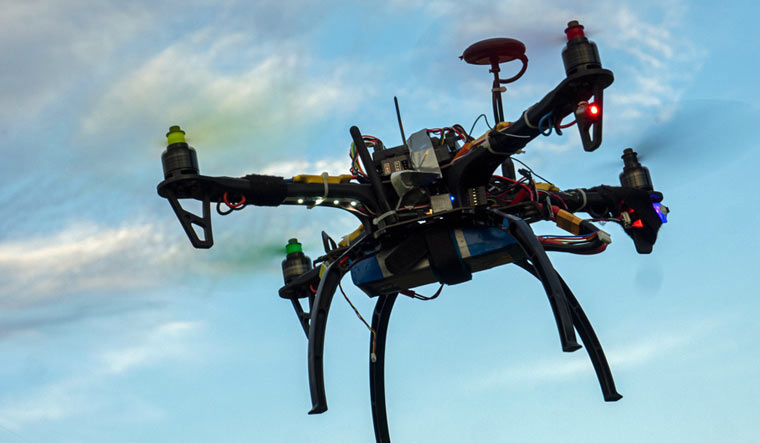Thirty-three AK 47 rifles, 28 pistols, half a dozen M16 rifles, under barrel grenade launchers, sniper rifles, three dozen magazines, grenades and more than 500 rounds of ammunition were airdropped by Pakistan using Chinese drones into Indian territory between June 8 and October 12. The data of arms and ammunition airdropped by drones flying from Pakistan and recovered by Indian security forces along the Line of Control and International Border is a wakeup call to the new emerging threat from Pakistan which is desperate to stir unrest in Kashmir, having failed to counter the abrogation of Article 370.
''On October 22, 1947 Pakistan had invaded Kashmir and this day marks the first infiltration by Pakistan. The horrific siege still continues with Pakistan trying new ways and deploying new technology to stoke unrest in Kashmir and disrupt peace,'' said a senior security official.
The use of drones by Pakistan to drop arms and ammunition into J&K is part of its latest strategy to carry out drone swarms attacks—which gives deniability and carries an element of surprise. It also marks a tactical shift from the decades old strategy of infiltrating terrorists into Indian territory.
The primary reason for Pakistan’s ISI reworking its terror strategy is the sharp fall in cross-border infiltration along the LoC and the IB due to the heavy counter offensive by India demonstrated by the Balakot airstrikes, heavy deployment of security forces in J&K ahead of the abrogation of Article 370 and subsequent steps taken by the government to boost surveillance and technological infrastructure in border areas.
With India deploying more troops along the LoC and the IB, making it difficult for the ISI to push in terrorists under cover fire provided by the Pakistani Rangers, the ISI is now resorting to the use of Chinese drones and it has become a matter of deep concern for the security establishment.
''These quadcopters flown from Pakistani territory are of Chinese made and carry loads of arms and ammunition that are then dropped into Indian territory, sometimes close to the LoC or the IB. Either the Pakistani terrorists who would have infiltrated some days in advance or their recruits within Indian territory are instructed to take these consignments to safe locations. The weaponry would be used to carry out terror strikes in Kashmir and hinterland,'' said a senior security official.
Another worrisome trend in recent months has been the virtual terror machinery unleashed by Pakistan, which has blurred the lines between the traditionally identified terror groups like Lashkar-e-Taiba, Jaish-e-Mohammed and Hizbul Mujahideen. The advent of new outfits like the Resistance Front, People's Anti-Fascist Front, Joint Kashmir Front and the Jammu and Kashmir Ghaznavi Front are only fronts for the dreaded terror proxies of the ISI, which are hiding behind new names to avoid international scrutiny and further crackdown by FATF, said a security official.
The online platforms are also equally dangerous as they are luring the vulnerable youth to join the terrorist groups in the garb of raising people's voice, providing financial support or giving them a space to air their grievances.
Security sources pointed out that the use of Chinese drones by Pakistan is not a matter of chance. The close collaboration between Pakistan and China to engage Indian security forces on the borders is the result of Pakistani government coming under Chinese pressure over the existing and potential factors bulwarking the Chinese projects in Pakistan, especially the China-Pakistan Economic Corridor. The new military formations and intelligence gathering are a direct result of this collaboration, said a security expert.
The Chinese drones come cheap for Pakistan, can hover at low speeds for hours and provide technological ease to the users. China is also a global leader in manufacturing armed drones, a fact that has benefited the Pakistani spy agency which is learnt to have supplied hundreds of these drones to state and non-state actors in Pakistan.
It may be recalled that Pakistan has failed to garner international support against India's move to revoke Article 370 in the last one year, the latest being the failed attempts by Pakistan and China to raise the issue at the United Nations Security Council in August. This has made Pakistan desperate to avoid international scrutiny about its interference in Kashmir. What has made matters worse for Islamabad is forums like the Financial Action Task Force, the global anti-terror financing watchdog, which are already livid and have asked it to implement its action plan of cracking down on terror infrastructure openly operating from its soil to avoid being black listed.








